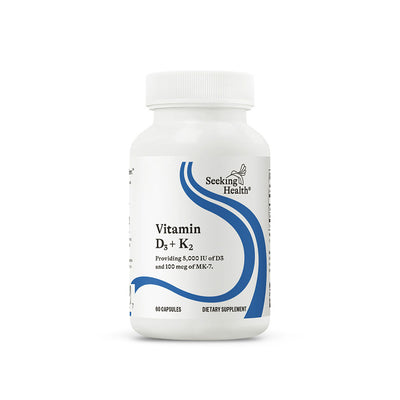L-Methylfolate is a remarkable folate supplement. In fact, approximately 80% of the folate in your blood is methylfolate, not folic acid—folic acid is often found in supplements and fortified foods, but it’s not bioavailable and is harder to metabolize.(1) Our guide to folic acid, folate, and methylfolate sheds more light on why you shouldn’t take folic acid and take bioavailable folate instead.†
I’ve personally used methylfolate for my health since 2011. Throughout this time, I've experienced both moments of joy and significant discomfort caused by methylfolate.
Allow me to share the information you need so you can avoid the challenges I faced. Initially, I didn’t know the best way to use methylfolate. My genetic report revealed that I am MTHFR compound heterozygous (one copy of A1298C and one copy of C677T).(2) This discovery led me to panic and take a methylfolate supplement every day.†
Oops.
Here’s what I learned along the way so you can make well-informed decisions about your health.
When Should You Take a Methylfolate Supplement?

You should take a methylfolate supplement before you exercise or when you’re experiencing one or more of the following:†
- High blood homocysteine levels(3)
- Excessive alcohol consumption(4)
- Pregnancy and breastfeeding(5)
- Cognitive problems like poor memory or brain fog(6)
- Poor blood flow(7)
- Nerve problems(8)
- Low mood(9)
- Heart problems(10)
These are the most common signs and symptoms, but not a complete list. Report any unusual or adverse symptoms to your healthcare practitioner right away.
It’s a common myth that you must take methylfolate daily. Like many myths, it’s wrong. You take methylfolate only when you need it. But there may be times when you do need to take it daily.† In this case, just remember to adjust your dose or stop it altogether when you feel better or your healthcare practitioner tells you to stop.
You don’t need to take methylfolate when you are feeling good. More is not better. More may mean you’ll experience the side effects you’ll read about next.
“It’s a common myth that you must take methylfolate daily. Like many myths, it’s wrong.”
What Are The Side Effects of L-Methylfolate and Folate?

Those who take methylfolate generally experience one of three responses:
- They take methylfolate consistently and feel absolutely wonderful! The only downside is that they wonder why they didn’t know about methylfolate before?!†
- They methylfolate daily and have an amazingly incredible week where they are happy, have great recall, and are alert. The second week comes, and they continue to take it daily. However, now they end up hiding in a room by themselves or literally throwing dishes across the room out of anger. Some even become bedridden from muscle aches, intense headaches, or joint pain. If they continue supplementation, they may experience panic attacks, increased joint discomfort, insomnia, and migraines.
- They take a small amount of methylfolate and feel all the methylfolate side effects right out the gate. No matter what they do, they can’t seem to tolerate it.
In general, these methylfolate side effects can include:
- Joint or muscle discomfort
- Sleep disturbances
- Skin issues like breakouts and rashes
- Agitation, impatience, and irritability
- Heartbeat irregularities
- Upset stomach
- Headaches and migraines
- Nerve discomfort
- Runny nose
- Auditory hallucinations
Why Do Methylfolate Side Effects Occur?
Methylfolate side effects can occur due to the following:
- Methylfolate is taken too often.
- Too much methylfolate is taken, resulting in over-methylation symptoms.(11)
- The existence of other nutrient deficiencies.
- Other genetic variations which increase the risk of side effects (COMT, MAOA).
What is the most important reason why methylfolate causes significant side effects? It’s taken just because of an MTHFR gene mutation. Unfortunately, you may not even be aware that these side effects are occurring, and you keep taking methylfolate because you mistakenly think you need to, which only makes things worse. If you notice or suspect side effects, talk with your healthcare practitioner immediately for instruction.
“...you may not even be aware that these side effects are occurring, and you keep taking methylfolate…which only makes things worse.”
Why Not Take Methylfolate Every Day?

Let's start by understanding the difference between supplementing and medicating.
You might think you must take methylfolate daily because you have the MTHFR gene variation. Or your health professional recommended it. But both reasons miss the mark.
Having an MTHFR genetic variation isn't a medical condition; it's a genetic vulnerability. Let's put things in perspective.
Do you fill up your vehicle’s tires every day? No, you do it only when they’re low. Do you fill up a car’s gas tank every day? No, just when you’re going on a long trip or returning a rental.
Think about it. Do you know why you’re taking methylfolate every day? Is it just because you fear having an MTHFR genetic variation?
For about two years, I took methylfolate daily out of fear. Then, I realized that my MTHFR variation reduced my function by 50%. That meant I still had 50% function remaining.
Here’s a better approach to taking methylfolate:†
- If you’re physically active, you might need more methylfolate.
- You probably don't need as much if you’re not pushing your body hard.
Remember, understanding your needs and responding accordingly is vital. You don’t need to take methylfolate every day, just like you don’t need to fill up your car's gas tank daily—unless you’re driving your car a lot.
Seeking Health® Methylfolate Supplements
Choose the right methylfolate supplements when you need extra support from Seeking Health®! Our methylfolate supplements are uniquely formulated by Dr. Lynch to support healthy methylation, homocysteine levels, brain function, pregnancy, and nervous system function when taken as part of a balanced diet. Our supplements never contain folic acid, only bioavailable folate!
- Methyl B12 with L-Methylfolate provides potent methylation, homocysteine, and MTHFR support with true folate (vitamin B9) and bioavailable B12.†
- L-Methylfolate supports healthy cognition, mood, and genetic expression through a superior form of L-methylfolate that readily donates its methyl groups.†
- L-5-MTHF - 25,500 mcg DFE supports healthy neurotransmitter formation by bypassing the MTHFR enzyme and providing methylation support for those with MTHFR polymorphisms. It also comes in lower-dose L-5-MTHF - 8,500 mcg DFE.†
The Bottom Line

Here’s a true story that quickly sums up everything you’ve read about:
Years ago, a friend of mine was struggling with the aftereffects of drinking quite a bit of alcohol. He asked if I had any suggestions to help alleviate his symptoms. Besides the obvious advice of drinking less, I recommended he consider taking methylfolate.
A month later, I visited him again. He told me how much better he felt and thanked me for the suggestion. While I was pleased to hear this, I still cautioned him that alcohol was still poisoning his body.
About six months later, I received a panicked phone call from him. He was driving in a remote location and experiencing auditory hallucinations, something he had never encountered before. He mentioned he hadn't consumed any alcohol in over a month.
I asked if he was still taking the methylfolate, and he confirmed that he was, as it had been very helpful initially. I explained that the methylfolate had been beneficial because he was drinking alcohol every day, but since he had stopped drinking, he no longer needed such a high dose.
He decided to stop taking the methylfolate and took 50 mg of niacin instead. He felt better almost instantly.
The lesson here is simple: take methylfolate when you need it, but don't take it when you don't. Both methylfolate side effects and deficiency symptoms can be serious, but thankfully, they can be avoided with proper usage.†
References:
- https://pubmed.ncbi.nlm.nih.gov/35999905/
- https://www.ncbi.nlm.nih.gov/books/NBK6561/
- https://pubmed.ncbi.nlm.nih.gov/38892484/
- https://pubmed.ncbi.nlm.nih.gov/28468303/
- https://pubmed.ncbi.nlm.nih.gov/37438496/
- https://pubmed.ncbi.nlm.nih.gov/37176516/
- https://pubmed.ncbi.nlm.nih.gov/32355442/
- https://pubmed.ncbi.nlm.nih.gov/22082324/
- https://pubmed.ncbi.nlm.nih.gov/24392264/
- https://pubmed.ncbi.nlm.nih.gov/11788454/
- https://pubmed.ncbi.nlm.nih.gov/37960352/
† These statements have not been evaluated by the Food and Drug Administration (FDA). These products are not intended to diagnose, treat, cure, or prevent any disease.












